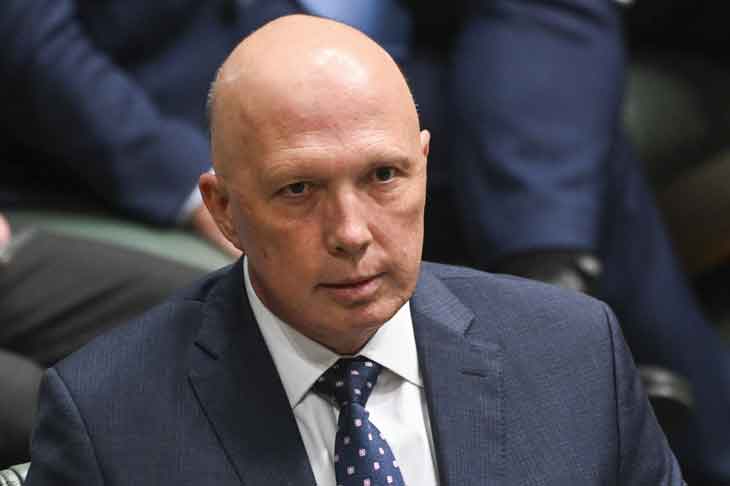Didn’t you just love the reaction of most mainstream media journalists, particularly at the ABC and Nine, to the thumping referendum loss? According to these wise heads – pause for laughter here – there are no political implications whatsoever for the federal government or the Prime Minister.
Pull the other one, I thought. Let’s face it, this ‘insight’ is more a reflection of hope than rational thinking on the part of most of the Canberra press gallery inmates.
Everyone knows just how much Albo had invested in the referendum. It was the first thing he mentioned in his election victory speech, implementing the Uluru Statement from the Heart in full. It was his number one priority.
He thought that he, alone, understood the Australian people. He knew in his heart (geddit?) that a very clear majority of voters would back the amendment to the constitution that involved both recognition and the Voice. (When did Aboriginal and Torres Strait Islander people become First Nations people, by the way? As far as I can gather, this is a Canadian term which was pinched by local elite activists here for political and rhetorical reasons.)
Albo was prepared to use a whole lot of his initial political capital on this bet, assuming that a victory would replenish his stock and clear the way for a second term. He never sought bipartisan support because he didn’t want it. The referendum would pass, giving him both moral and political wins. Peter Dutton, opposition leader, could then be portrayed as being out of touch with ordinary folk and the current zeitgeist.
Of course, the best laid plans have a habit of going awry. There must now be many people in Labor and on the left generally who wonder whether having the referendum really was a good idea.
To my mind, it was an excellent idea because only in this way could we know what people really think in the privacy of the ballot box about giving special constitutionally protected rights to one group. (Surveys are flawed by elicitation bias in which respondents opt to sound worthy irrespective of their private views.)
Indeed, Fraser Nelson, editor of The Spectator, wrote that ‘Australia has just had the world’s first referendum on identify politics…. It was pitched as a battle between compassion and cruelty.’ He argues that the result has implications worldwide.
To be sure, there was a variety of reasons why people voted No – from in-principle rejection to uncertainty about the benefits, from lack of information to distrust of government. The completely hopeless pitches made by the Yes side also contributed to the result.
How could a ‘modest’ proposal also make a radical difference to the outcomes for indigenous people? Why would people be influenced by self-serving businesses, sporting bodies, charities and universities? Where were the rebuttals to the powerful commentary of No campaigners, Jacinta Price and Warren Mundine?
But just because the referendum has been defeated doesn’t mean that the Uluru agenda has gone away. In Victoria, it’s all systems go, with a specially elected assembly, a truth-telling commission (handing down a particularly appalling report) and talk of treaties. (It is interesting to note here that only seven per cent of eligible indigenous voters bothered to vote for the assembly.) By contrast, the Queensland and New South Wales governments appear to be reading the zeitgeist better and have dropped talk of special treatment and treaties.
I’m not sure the Albanese government would have welcomed the descriptions of the referendum result contained in the anonymous letter from the elite Yes campaigners. There it is described as ‘a shameful act’ and those who voted No are ‘appalling and mean-spirited’. That these unknown persons could refer to the ‘lies’ that were evidently the No campaign’s ‘primary feature’ is surely more a sign of these activists being sore losers than of them having any real insight into the reasons for the result.
In this context, it’s worthwhile quoting US Republican Congressman and libertarian, Ron Paul. He makes the valid point that, ‘Government exacerbates racial thinking and undermines individualism because its very existence encourages people to organise along racial lines in order to lobby for benefits for their group. Their lobbying, in turn, creates animosity and suspicion among all groups, each of which believes that it is getting less of its fair share than the others.’
This is an important argument because it contradicts the (admittedly left) view that politics is always downstream from culture. According to Paul, government action has, at least in part, created identity politics and has fostered greater feelings of divisions among society. By favouring one group, other groups by definition must lose out – and people realise this.
It is one reason why the recent decision of the US Supreme Court to outlaw racially based affirmative action admission policies by universities is such an important development. These arrangements have been in place for many years and, if anything, have been ramped up recently. But a group of Asian-Americans understood very clearly that they were losing out, notwithstanding their outstanding academic results on average.
Indeed, Chief Justice John Roberts made this very point in the written decision. ‘Respondents’ assertion that race is never a negative factor in their admissions programs cannot withstand scrutiny. College admissions are zero-sum, and a benefit provided to some applicants but not to others necessarily advantages the former at the expense of the latter.’
The conclusion was drawn that the Equal Protection Clause of the Fourteenth Amendment [of the Constitution] applies ‘without regard to any differences of race, of color, or nationality. Eliminating racial discrimination means eliminating all of it’.’
The decision raises the broader question of whether identity politics, at least in the US, has peaked and we are about to enter a more sensible period in which individuals are judged by the ‘content of their character’ – to quote Martin Luther King. Will we see the demise of the Diversity and Inclusiveness officers who occupy high-paid positions in both the private and public sectors?
Sadly, I think it’s too early to call the peak of identity politics in the US, here or in any other Western countries. Judged by the public tribal responses to the massacre of innocent Israeli citizens by Hamas – extremely well-attended pro-Palestine demonstrations are becoming an almost daily occurrence in the US, UK and here – suggest that the forces that separate us are currently greater than those that bind us.
Both the referendum result here and the US Supreme Court decision have been mere spanners in the identity politics apparatus. Creating division requires less work by governments than fostering unity. Unity requires a universal signing up by the population to an agreed set of values, including love of country, individual rights, non-discrimination, diligence and abiding by the law.
Is this really too much to expect of our citizens?
Got something to add? Join the discussion and comment below.
Get 10 issues for just $10
Subscribe to The Spectator Australia today for the next 10 magazine issues, plus full online access, for just $10.
You might disagree with half of it, but you’ll enjoy reading all of it. Try your first month for free, then just $2 a week for the remainder of your first year.














Comments
Don't miss out
Join the conversation with other Spectator Australia readers. Subscribe to leave a comment.
SUBSCRIBEAlready a subscriber? Log in